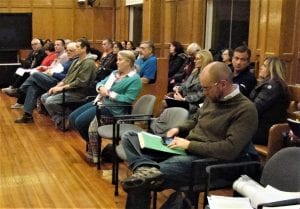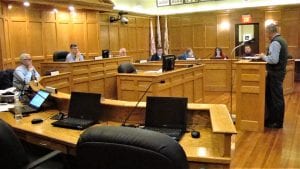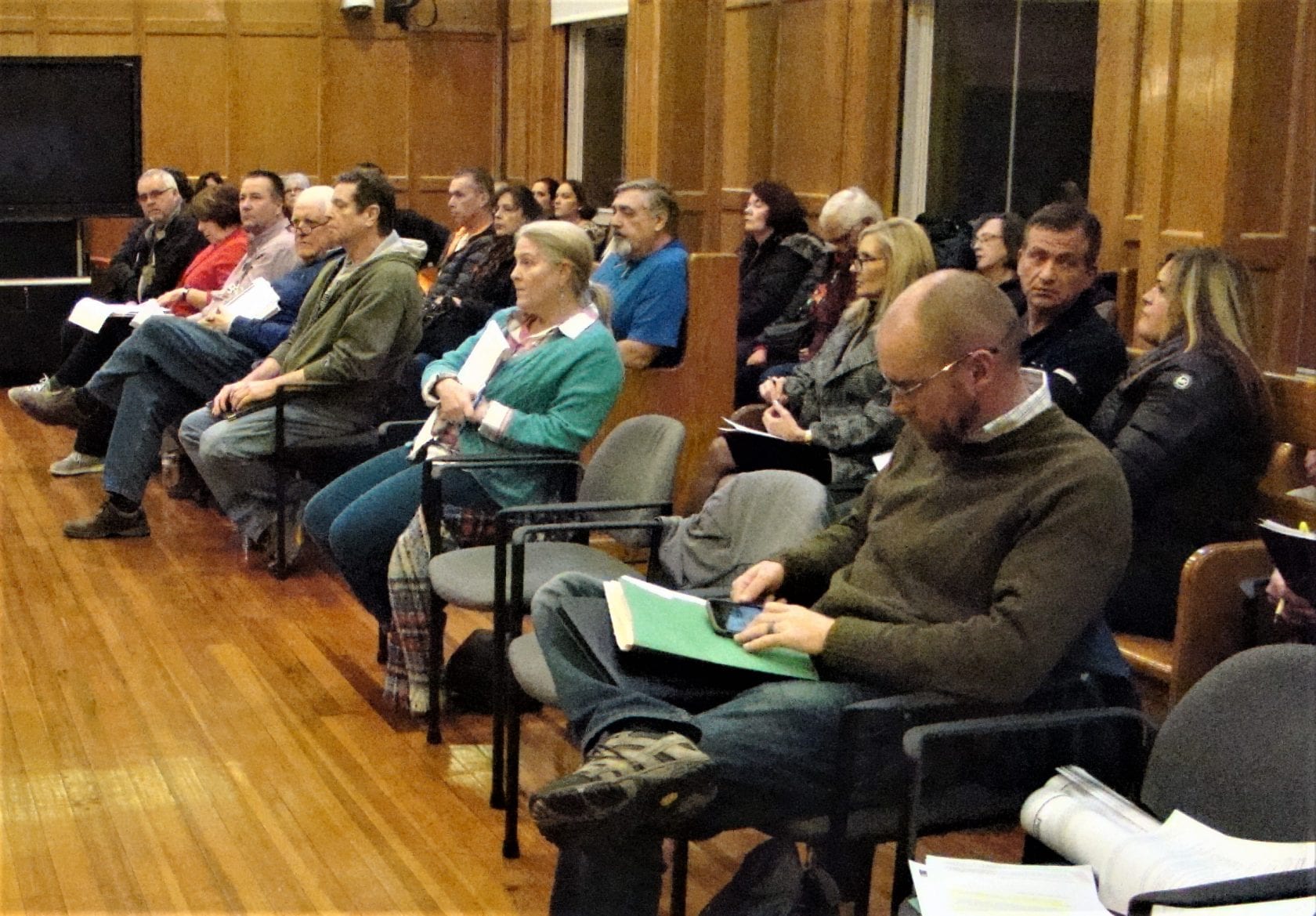
The public attends the hearing on Special Permit granting authority at the Planning Board Tuesday. (Photo by Amy Porter)
WESTFIELD – Among four public hearings on the City Council agenda for Thursday’s (Dec. 6) meeting, will be the second this week to amend the zoning ordinance by transferring Special Permit granting authority from the City Council to the Planning Board for commercial properties.
The Planning Board held the first public hearing on the topic on Tuesday. Early in the meeting, Chairman William Carellas asked for a motion to change the order of the agenda and put the Special Permit change first, due to the numbers of people who came to speak on the topic. Two and a half hours later, the Planning Board voted unanimously to recommend the changes to the City Council.
The amendment was presented by At-large Councilor Brent B. Bean, II as one of the petitioners. He said that currently the Planning Board has the majority of special permits, and said the majority of the City Council voted to send this motion forward for consideration by the Planning Board.
“In my opinion, because you see it more, you become more expert,” Bean said. He said the changes are all on the commercial side, none on the residential side, and stemmed from recommendations made in an economic development assessment report (EDSAT) from Northeastern University’s Dukakis Center on Policy and Regional Planning. He said he believed moving the granting authority would help with the merits of each project, and avoid the politics on the City Council side.
City Advancement Officer Joe Mitchell said his role for the city is to help citizens lower their tax rate by bringing in business. He said the report identified some of Westfield’s strengths, including proximity to rail and highway; its web presence and municipal light plant.
He said identified weaknesses included the commercial tax rate, English and math proficiencies out of high school, and the permitting process; in particular, that a Special Permit has to go through two boards. He said the changes would be solely for permits in Business A, B and C, Commercial A, Industrial Park, Industrial A and Airport zones, and no residential zones.
Speaking to some of the criticisms on social media, Mitchell said the motion is not a “power grab,” but would bring consistency and speed to the permitting process, saving time and cost. He said the Planning Board makes multiple land use decisions twice a month, and the City Council twice a year. He also said the Planning Board makes decisions based on the merits. “It’s supposed to be objective,” he said, adding that for those who are concerned about accountability, public hearings are an option.
Mitchell refuted the notion that the Planning Board is a “rubber stamp for the mayor,” giving the examples of permits denied in the recent past. As for comments that there is no enforcement of conditions by the Planning Board, Mitchell said there is no enforcement on conditions set by the City Council either. “I’m trying to provide consistency,” Mitchell said.
During the hearing, several Planning Board members spoke in favor of the change. Philip McEwan addressed what he called the “conspiracy theory,” saying that he has worked under six mayors, and never once had a conversation with them about zoning. He said he believes the City Council is forced to make popular decisions protecting neighborhoods that are not legally defensible. “You can’t just make random decisions,” he said, adding that in order to do the reviews, you have to know the zoning laws as they relate to special permits, and the case law behind them. “It’s more in depth than people think,” McEwan said.
Carellas said he would speak in favor of the proposal specifically due to a question asked by resident Barbara Rokus earlier in the meeting as to whether the Planning Board takes past performance by a business into account in their decisions. In response, Carellas said that each project has to be considered on its own individual merit, because the law says it must.
“Our decisions are often made long before this room, because zoning dictates what we do,” Carellas said. “We’re the best body for this,” he said, adding that every member of the board is for the City of Westfield.
“We as a board are doing a fantastic job. We talk to each other, listen to each other,” said member Cheryl Crowe, adding that she still often refers to the zoning book. “I believe we are an impartial board. This is putting it back in balance,” she said.
Ward 6 Councilor William Onyski said he had previously served 13 years on the Planning Board. He had often wondered why the board had the authority to vote for a power plant, but not a tractor yard. “I found it to be very odd,” Onyski said, adding that he wanted to speak to the motion from a logical point of view. “We need to take politics out of this. The Planning Board is the better way to do this. They are appointed by many mayors and approved by the City Council,” he said.

City Councilor Dan Allie addresses the Planning Board during the hearing. (Photo by Amy Porter)
Resident Ruth Aborjaily-Bannish said her family owns residences, community buildings, community lands and woodlands, and her husband owns land and farms. “I’m coming to you because I pay a lot of taxes. It’s all higher, because in Westfield businesses offset taxes for residents. I think when a business takes the time to come to Westfield, they pay a lot of money to site. I think we need a professional board to be impartial evaluators, because jobs increase, taxes increase, quality of life increases,” she said.
Another resident said that there had been a lot of talk about the benefit to businesses coming in, but that the change in the process would also benefit current business owners like himself.
Resident Meridith Salois said she owns a residence that abuts a business. She said the process as a whole needs to be reviewed. “I do like the checks and balances of the City Council enforcement piece,” Salois said, becoming the first to speak against the proposal.
Constance Adams of Root Road said she has been in business a long time, and is also concerned about not having checks and balances. “You make a decision non-politically, and you don’t have to listen to residents,” she said, adding that one of the things residents in Ward 1 had been experiencing is zoning changes. “What was five years ago Residential or Business A becomes Industrial A,” she said
“I appreciate every board member, and that you go by the law. My concern is this fast track. In the past 40 years, it has been the citizens that have done background checks. You’re concerned with the legal; we’re concerned with everything else,” said Barbara Rokus.
Resident Kristen Mello reminded the board that Westfield is an environmental justice community, and it’s a question of rights. “You are taking away our rights. The residents have a right to our opinion. We do not deserve to be made fun of for exercising them,” she said, asking for an apology for a comment made earlier about beginning the “parade” of opponents; which she received from the chairman. Mello also read the entire list of weaknesses identified in the EDSAT report, asking if the others would be addressed.
“I cannot speak strongly enough against this proposal,” said former Councilor Mary O’Connell, adding, “We’re in a tough position because you’ve all made up your minds, and three of you have spoken.” O’Connell said she didn’t think the board should have given their opinions before hearing from the public. She said the City Council has approved 39 permits over the last ten years, and should not shirk their responsibilities. “Councilors are making close to ten times what you are making,” she added.
“Just because I speak for it, doesn’t mean my mind is closed,” Carellas said.
“I agree that some of these things don’t really belong in front of us,” said At-large Councilor Dan Allie, suggesting that the items be considered individually.
“I agree that we probably need to look at each one of these things individually,” said Ward 1 Councilor Mary Ann Babinski. She said the stated purpose of the Planning Board is to aim to ensure that Westfield “continues to be the best place to live, work and play by putting people, the environment and the quality of life first.
“We’ve had people dissatisfied, who are not sure about how government works. You have to listen to their concerns, because they are valid. I’ve had calls that you put in conditions, but there is not enough good oversight on enforcement. What good is it if you can’t enforce it,” continued Babinski, adding that people don’t want permits fast-tracked.
“We’ve been beaten up pretty hard about enforcement tonight. Since we don’t have enforcement, how do we enforce them,” Carellas asked Babinski, who said the two bodies should sit down and talk about it.
“We are not an enforcement body. This is not our job,” added Robert Goyette.
During the discussion by the board, John Bowen said regarding checks and balances, he had served going on a year, and had spent more time listening than talking, and that many times the Planning Board had done studies on projects. “I’m a city resident,” Bowen said.
Crowe repeated her support of a lot of the changes, but asked Mitchell what if they went back to the drawing board on the proposal. “Maybe there are some things that need to be pulled out of this,” she said.
Mitchell said the Planning Board will make a recommendation to the Council, and City Planner Jay Vinskey said the council can’t vote without it.
McEwan moved to close the public hearing, and to send a positive recommendation to the Council.
“Whatever the City Council wants us to do, we’ll do it. But understand, I came in here with an open mind,” said Bernard Puza.
“This gives the City Council another chance,” agreed Jane Magarian, adding, “Let the City Council figure it out.”






